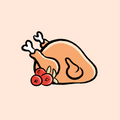

Here are all the important know-hows and how-tos when it comes to storing and pouring wine like the pros!
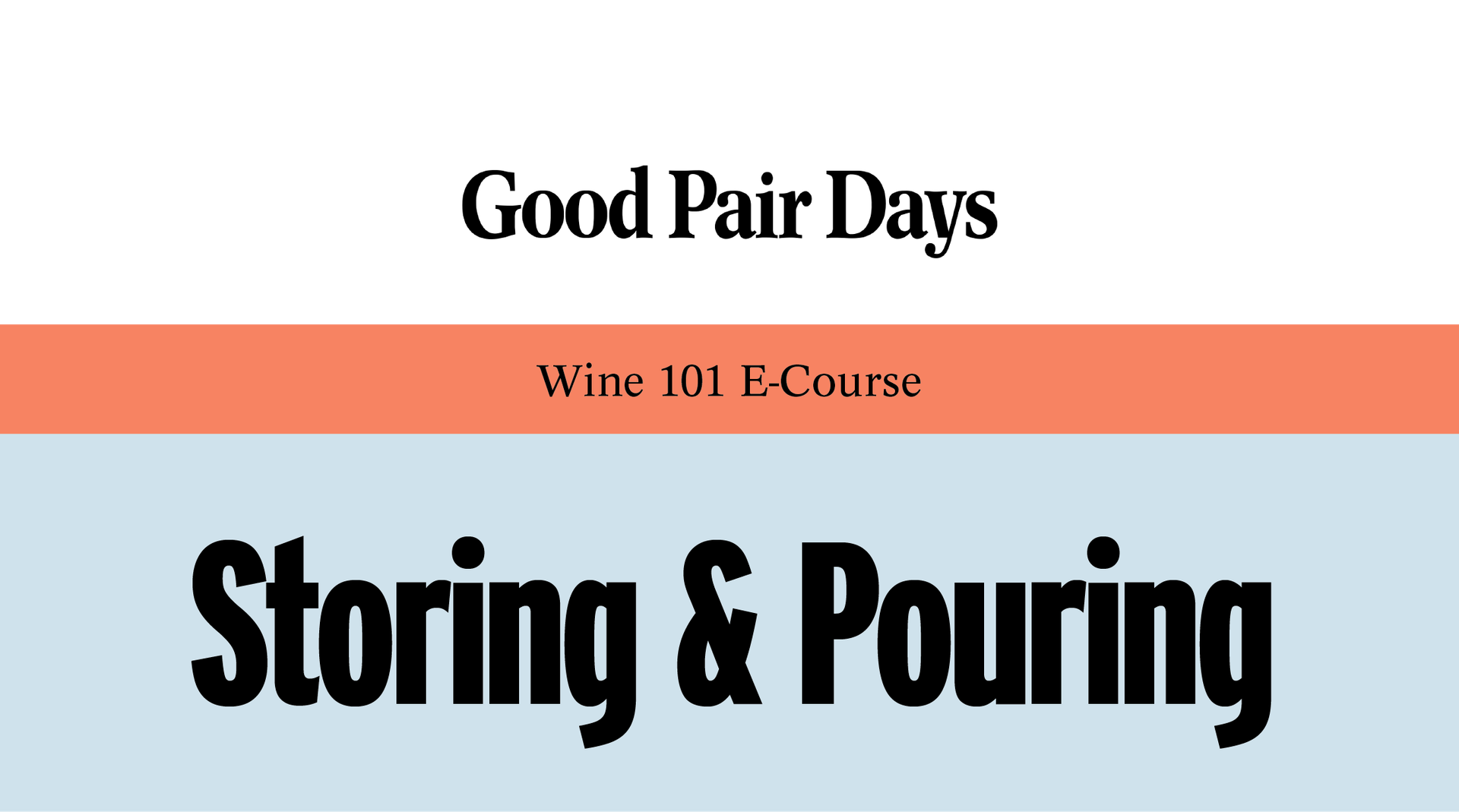

Whether your wine is already open or is tucked in the cellar for a special day, knowing how to keep your precious bottles safe at all times is an important task!
When it comes to cellaring wines properly, knowing which wines are even worth cellaring, decanting wine and tips on how to store bottles you've already opened, here's all the important know-how's and how-to's when it comes to storing and pouring wine!
Your wine coaches,
Banjo & Alex

Wine can be strange and sensitive stuff. Unopened or not. Even though it's made from pulverised fruit which is squashed by whatever means are at hand (be it by mechanical presses or the village maidens’ feet) and is often left alone in a dark cellar for years on end, it still ends up being a bit fragile. This is especially true for well-aged and collectible wines, which always look like they’re being handled the way Indiana Jones picks up that golden idol, at the beginning of Raiders of the Lost Ark.

For most of us, we don’t need to worry about cellaring our bottles of wine in carefully controlled rooms, with all sorts of expensive equipment measuring the slightest changes in the atmosphere... we drink it before it has a chance to request any coddling! But that doesn’t mean we don’t want our wines to reach us in the best possible condition, and nor does it mean we won’t be heartbroken if we find our beloved bottles have been spoiled somehow. This is why these easy steps to store your wines properly are so important!

Temperature
Make sure your wines are stored below temperatures of 18C - as cool as you can find. Heat can cause physical reactions inside the wine to dramatically speed up, and this can result in a massive change in the way the wine tastes. It can become unpleasantly acidic, or the tannins could get far rougher and less pleasant on the palate.
It's also important to keep your precious bottles somewhere they’ll be protected from extreme fluctuations of temperature, which can shock the wine and affect how it develops.
Moisture/ Humidity
Another factor to consider when storing wine is whether or not the environment is a humid one. This is a tricky one to master. Too dry and the corks will shrivel and wine will leak. Too wet and you're just inviting mould to grow. This won't necessarily harm the wine inside the bottles, but it sure is a pain! In climates where humidity and heat combine, make ample use of your fridge to avoid any issues.
Movement/Vibration
The less a wine gets jostled around, the better. Wine importers know this, and always leave wines that have recently been imported from overseas at least a few weeks before making them available for sale. The reason is that constant movement can 'jumble' a wine, and make its flavours confused and mixed up.
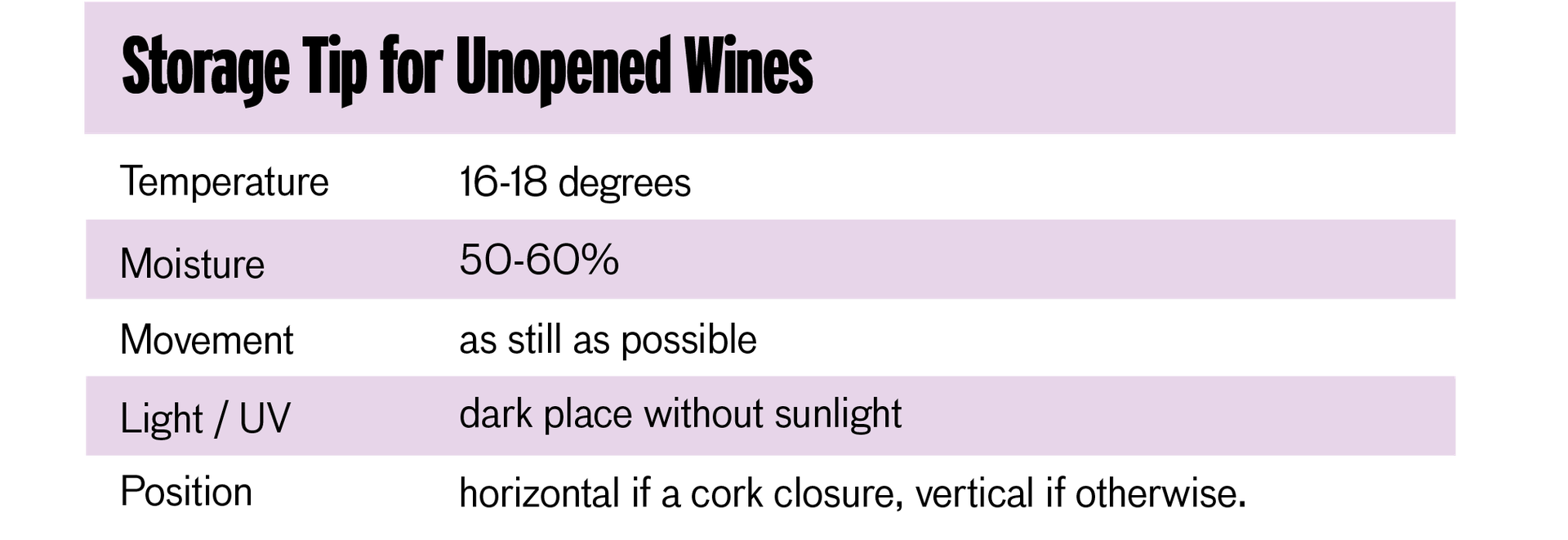
Which Wines to Cellar
It's great to be able to have a little wine rack at home, with a few bottles for drinking any old Friday night, and then a few special bottles you're hanging onto for a birthday or maybe end of year celebrations. But how do you know which bottles will improve with age, and which ones are better drunk young and fresh?
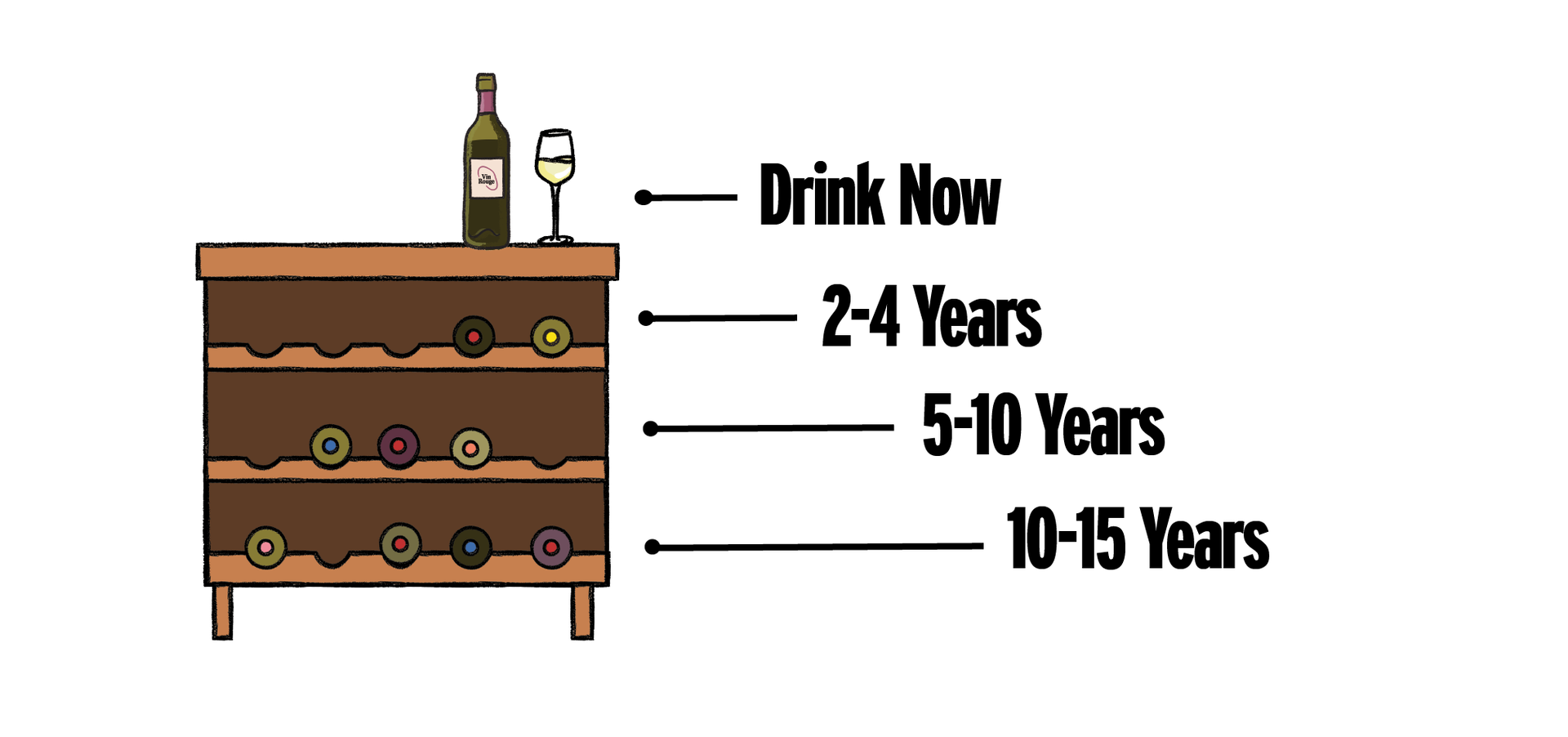
Most wines happily live for at least a year
Unless you've bought an older wine already, there's no problem hanging onto a bottle for at least a year. Wine is tough, and will slowly change over the course of 12 - 18 months, so don't be afraid to stash a bottle or two.
Some white wines can age well too!
Most people fill their cellars with red wine, but whites can age as well. Lean whites (Riesling, Semillon etc) will fill out and take on more texture and roundness, whilst fuller whites will become more honeyed and creamier.
Look for wines high in acidity or tannin
A wine that is high in acid or tannin is generally a good bet for ageing. The reason is that both attributes act as preservatives for the flavours in the wine and keep the wine fresh as it ages. Wine with residual sugar (eg 'lots' of sweetness) can also age well.
Dense Reds
Not all reds are built for the long haul, so do look for acidity or tannin as the first marker. The other factor that can help a wine's ageing is the oak treatment. If a wine has a lot of oak, the fruit sometimes needs some time to find its feet and find balance in the wine. These kinds of wines are best for ageing for a short while - 3 to 5 years.
Expensive wines
A lot of wines that are highly priced are generally built to age. It may only be for 5 or 6 more years, but as a rule, more premium wines will happily last this long and slowly evolve as they do.

Wine leftover at the end of the night? Sure, it might not happen too often, but when it does, what's the best way to keep that wine fresh? There are only a few rules to play by here, and for those holding onto hope, sadly putting a spoon into the top of the bottle isn't one of them. The main concept is to protect the wine from oxygen by closing the bottle tightly and watching the temperature.

Closure
You're basically wanting to close the bottle as tightly as possible. Oxygen is the enemy of your delicious wine and will turn it into vinegar if it gets the chance. So either push a cork firmly back into the top of the bottle or if you're drinking sparkling wine, use a special champagne stopper to create a seal around the top of the bottle.
Temperature
The second factor is temperature. The warmer it is, the faster the wine will degrade and turn into something you don't want to drink. To counteract this, pop the bottle into the fridge (standing upright) until the following day when you plan to drink it. Do this even if it's red wine, and just let the bottle come back to temperature the following day before drinking. Obviously, a combination of these two is the best approach, but it should be noted that this doesn't buy you weeks more of drinking. A few days, probably 4 or 5 at most for regular wines, and 2 or 3 for sparkling wines is a good guide.
How long can you keep an open bottle of wine?
Refrigerating helps slow the degradation of a bottle, as does keeping your wine in a dark place out of direct sunlight. Again, the mission here is to preserve the wine as long as possibly by ensuring the wine experiences as little contact with oxygen as possible. As a general rule, most wines still taste true to character for 1-3 days after opening, but it's day three onward that can vary depending which wine style you have open. Learn how long different styles of wine last here!
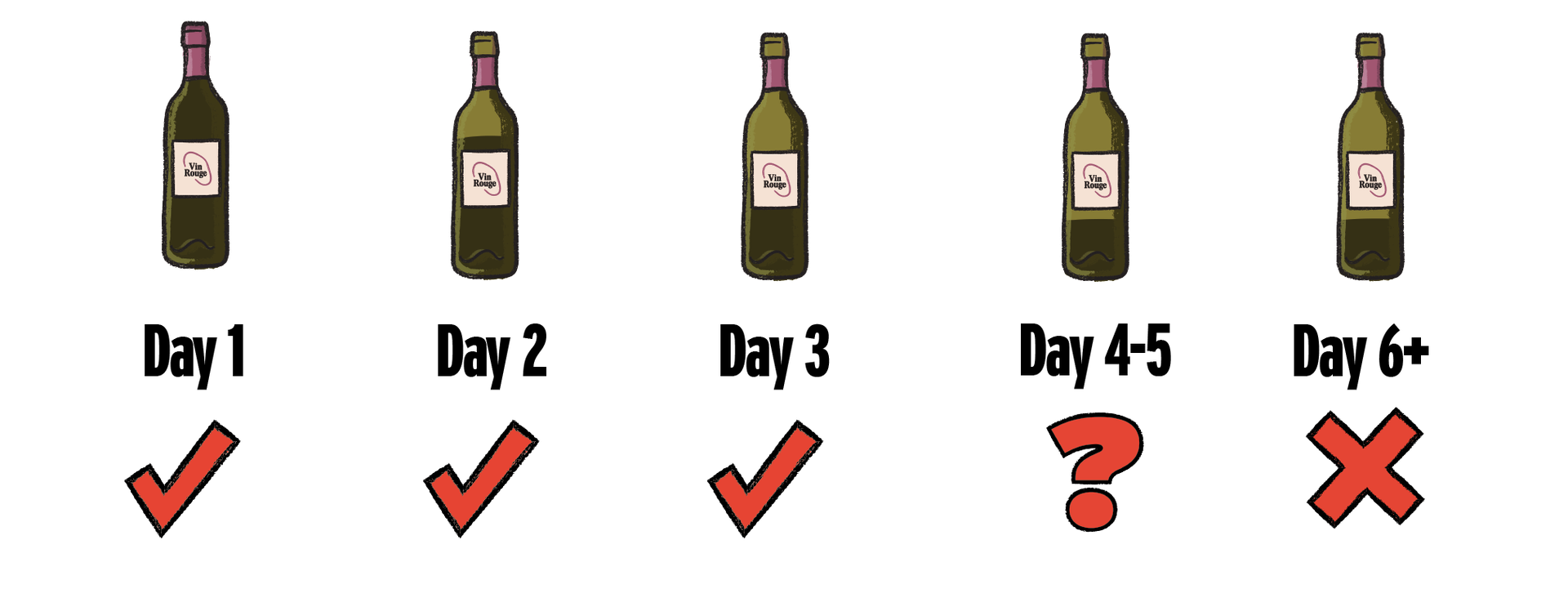

Whether you're at home or out at a restaurant, there are some important things you can do to elevate the enjoyment of your wine, and make opening any bottle and every glass a winner!
Wine Temperature
Serving wine at its optimal temperature allows the full range of flavours and aromas to come forward in the glass; too warm and the taste of the alcohol takes over, too cool, and aromas and flavours can become muted. Things like whether the wine has seen any time in oak, how much acidity it has and how much sweetness it has can all affect the ideal temperature. In general, the more acidity the wine has, the cooler it should be served. And the richer, rounder the wine is, the warmer you can serve it. Learn the perfect temperatures here!

Glassware
The shape and size of a glass can enhance the aromas, flavour profile, and mouthfeel of a wine. This is relative to the size of the bowl and the rim of the glass. This ratio can affect the concentration of aromas and directs how the wine hits your palate and therefore how you will experience the wine's flavours and structure. Find out which glasses are best for which styles here!

Decanters
Decanting helps aerate and/or filter sediment in wine. Young, tight reds benefit from the aeration decanting offers by making the wine far more mellow and rounded than it would be straight from the bottle. Older reds benefit from the sediment filtration method of decanting. High-end, aged white wines, too, benefit from the openness and roundedness decanting brings a wine through a little splashing and integration of oxygen! Never used a decanter? Learn how here!

Sediment
Sediment is all the bits and pieces (grape skins, seeds, stems) that hang around after it has been turned into wine — it is entirely natural. Some winemakers choose to filter it out for a clearer looking wine. While others choose to keep it, claiming it adds more complexity, texture, authenticity and expression to the finished wine.


Key Reading
1. Pairing Main Flavours : A general overview.
2. Wine Storage : A general overview
3. A Guide to which wines you should cellar.
Bonus Reading
4. Learn more about the different red wines and white wines to find out which ones are more cellar-worthy than others!
5. Polish up your skills when it comes to opening a bottle of sparkling wine. There's a pro technique you should be trying!
Quiz
Ready to prove your new knowledge? Take the Chapter 6 Storing & Pouring Quiz! You'll earn your Chapter 6 Badge as well as 50 points by scoring 7/9 correct!
Homework
The best kind of assignment... tasting!
For today's assignment, you will use a glass decanter! Don't have a decanter? That's okay, remember a decanter's main purpose is to aerate the wine, so using a glass water pitcher, a (well-cleaned) glass vase, or even pouring the wine into a pot can still do the trick!
Select a bottle of wine (we encourage red for this experiment, but anything goes). Pour half the bottle into a decanter and let it sit. Close up the rest of the bottle using your new skills on proper wine storage for open bottles. Let 15 minutes pass, and then swish around the wine in the decanter so that it gets a breath of fresh air. If you decided to use a pot make sure not to spill! After the 15 minutes are up, grab two different glasses, and pour some of the decanted wine in one, and the un-decanted wine straight from the bottle that was opened (and then closed) into the other. Taste them side by side.
What did you notice? Did the wine bring out more or fewer flavours? Did the structure of the wines feel the same? Or was one softer and another harder? And more importantly, which glass did you like best?
Keep trying it! Let the wine decant longer, and compare some more! See how it evolves and discover the stylistic expression you like best.

Now that you've polished up your storing and pouring skills you could run a restaurant wine program! Well pretty soon anyway ;) But there's still plenty of fun to be had for domestic wine lovers too. Especially once you've graduated from this course. The wine world just keeps getting bigger and brighter!
Happy Wine Learning!
Alex & Banjo
Do you know your wine personality? If your answer is no, take our quiz to find out which wines to pick up next and build your box!
Build my box




